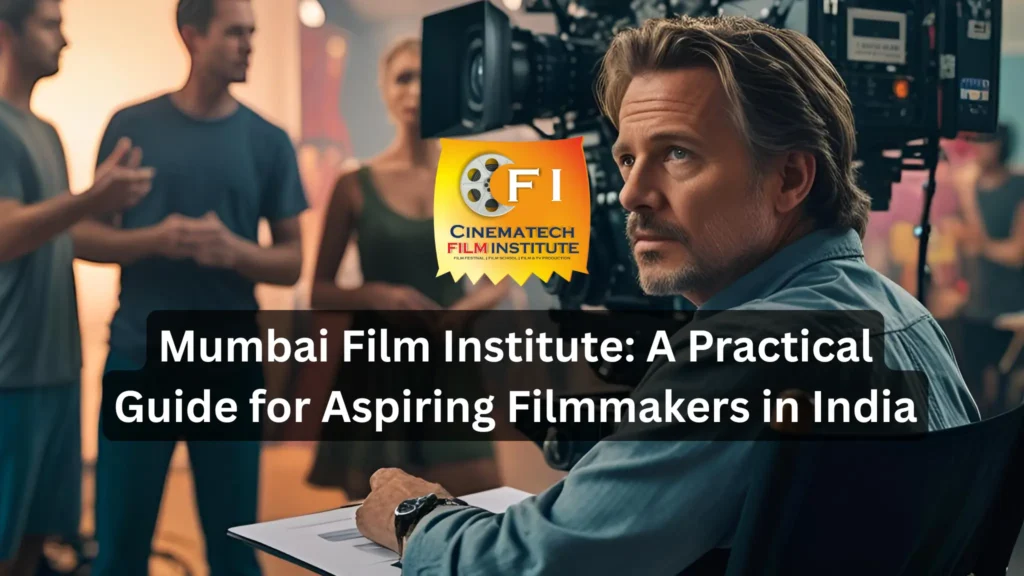Introduction: Why Mumbai Remains the Hub of Film Education
For generations, Mumbai has been the epicenter of Indian cinema. From Bollywood blockbusters to indie films and OTT content, the city offers not just a stage — but a full ecosystem for storytelling.
It’s no surprise that thousands of aspiring creators search for a Mumbai Film Institute every year, hoping to build a career in direction, acting, video editing, cinematography, and scriptwriting.
But in 2025, becoming part of the film industry demands more than just passion — it requires practical skills, industry knowledge, and adaptability to new technologies.
This guide explores how to choose the right film institute in Mumbai, what modern filmmaking education looks like, and how institutions like Cinematech Film Institute are bridging the gap between traditional learning and the future of cinema.
What Today’s Film Students Really Need
Searching for a “Mumbai Film Institute” used to mean finding a place with basic acting or directing classes. But the expectations — and opportunities — have changed.
A good film institute in Mumbai should offer:
1. Hands-On Training
Practical exposure is key. A good institute should provide real shooting experiences, editing labs, and opportunities to direct, act, or produce short films.
2. Industry-Relevant Curriculum
Film tools and platforms keep evolving. Institutes must teach current trends — from DSLR to cinema cameras, from Adobe Premiere Pro to DaVinci Resolve, from reel-making to YouTube storytelling.
3. Short-Term & Specialized Courses
Not everyone wants to pursue a 3-year degree. Short-term certificate or diploma programs focused on skills like video editing, sound engineering, or acting are often more efficient and career-focused.
4. Exposure to Modern Tools (Including AI)
New-age filmmaking involves automation, AI-enhanced tools, virtual production, and more. Institutes that include this in their curriculum give students an edge.
5. Mentorship by Working Professionals
Learning directly from filmmakers, actors, editors, and writers active in the industry helps bridge the gap between classroom and career.
Types of Courses Offered by Top Film Institutes in Mumbai
Here are the most in-demand courses offered by reputed Mumbai-based film schools:
| Course | Duration | Ideal For |
|---|---|---|
| Film Direction | 3 to 12 months | Aspiring filmmakers and storytellers |
| Acting for Screen | 3 to 6 months | Beginners or intermediate performers |
| Video Editing | 2 to 4 months | Editors, vloggers, and YouTubers |
| Cinematography | 3 to 6 months | Camera enthusiasts and DOPs |
| Script Writing | 2 to 5 months | Writers, lyricists, dialogue creators |
| Filmmaking with AI | Workshops / modules | Tech-forward creatives |
| Sound Engineering | 4 to 6 months | Audio professionals and editors |
Choosing the Right Film School: What to Look For
Not all film institutes are created equal. When choosing a filmmaking institute in Mumbai, keep these questions in mind:
- Are the faculty members active professionals or full-time teachers?
- Do students get to shoot, edit, or act in actual projects?
- Is there a focus on AI, OTT formats, and modern content styles?
- Does the institute assist with internships, freelancing, or job placement?
- Are the courses flexible enough to fit different goals and timelines?
Cinematech Film Institute: A Practical, Modern Approach
Among the emerging names in Mumbai’s film education space, Cinematech Film Institute stands out for its industry-relevant, accessible, and tech-integrated curriculum.
Rather than offering lengthy degree programs, Cinematech focuses on short-term, skill-based courses designed to prepare students for the current demands of the media and entertainment industry.
What Sets Us Apart?
- Practical Learning Environment: Students work on actual shoots, edit real footage, and build portfolios during the course itself.
- Modern Curriculum: Includes AI in filmmaking, social media storytelling, mobile video production, and OTT-style editing.
- Mentorship Model: Courses are taught by working professionals — directors, editors, actors, and writers.
- Budget-Friendly: Designed for middle-class families and passionate students from across India.
- Location Advantage: Situated in Mumbai, with proximity to film studios and digital content hubs.
Cinematech offers a mix of traditional training (like acting and script writing) and future-forward courses (like filmmaking with AI), making it a strong contender for anyone searching for a reliable film institute in Mumbai.
The Bigger Picture: Trends Shaping Film Education in India
Before choosing any institute, it’s important to understand where the industry is heading. Here are a few trends shaping media and film education today:
Content Creation Is the New Entry Point
Aspiring directors or actors no longer need to wait for a break — they can create content, gain followers, and attract industry attention independently.
AI and Automation Are Changing Post-Production
Tools like Descript, RunwayML, and Adobe’s AI suite are redefining how editing, dubbing, and visual effects are done.
Demand for Multidisciplinary Creators
Whether it’s a cinematographer who also edits, or a screenwriter who understands direction — versatility is the new superpower.
Regional & Global Opportunities Are Expanding
With the rise of OTT platforms, regional cinema and cross-border collaborations are opening doors for more creators — especially those trained in storytelling and content formats.
Creator Economy Integration
Many students are building personal brands on social platforms. Institutes that help you create showreels, manage content, and understand audience-building can accelerate career success.
Skill-Based Certifications Over Degrees
The demand is shifting from “qualifications” to “skills.” Recruiters and producers want to see what you can do — not just what you’ve studied.
Making the Most of Your Time in Film School
No matter where you study, here are a few tips to maximize your learning experience:
- Treat each assignment like a real project.
- Collaborate with other students — future filmmakers, editors, and actors often meet here.
- Start building your portfolio from Day 1.
- Use online platforms to publish your work.
- Learn storytelling, not just technology.
Final Takeaway: Your Learning Path Is Your Launchpad
The idea of a “Mumbai Film Institute” is evolving. It’s no longer just about where you study, but how and what you learn.
Whether you dream of becoming a director, actor, editor, or scriptwriter — Mumbai offers the right energy, exposure, and mentors. But the key lies in choosing an institute that aligns with today’s filmmaking realities.
Prioritize learning over brand names. Prioritize real-world experience over degrees. Most importantly, start.
Because in the film world, it’s not about where you begin — it’s about how persistently you create.
If you’re searching for the right film institute in Mumbai, look beyond brochures and big names. Ask:
- Will this institute help me build a portfolio?
- Am I learning skills I can use immediately?
- Will I be industry-ready within months, not years?
Institutes like Cinematech Film Institute are building a strong track record by focusing on practical learning, accessibility, and future-facing skills.
Whether you want to be behind the camera, in front of it, or writing the story itself — your journey can begin today, in the city that lives and breathes cinema.

